Cause 5: Dehydration

Our bodies operate like a finely tuned machine, with water acting as the oil that ensures smooth functioning. Accounting for approximately 60% of our body weight, water is integral to countless processes. Among its pivotal roles, aiding in digestion, maintaining body temperature, and ensuring adequate saliva production are paramount. When we deprive our bodies of this essential fluid, things start to go awry, and one of the first casualties in this neglect is the salivary glands.
Saliva isn’t just water; it’s a cocktail of enzymes, electrolytes, and other compounds that aid in digestion and oral health. Its production is heavily reliant on being well-hydrated. Dehydration thickens this concoction, making it more viscous. As a result, it doesn’t flow as smoothly through the ducts, causing a backlog. This stagnation is not merely a mechanical problem. Thickened saliva is an ideal medium for bacterial growth, leading to infections that can culminate in parotitis.
When dehydration starts affecting the salivary glands, the body sends out signals. A parched mouth and throat, difficulty swallowing, and a change in saliva consistency are early indicators. As the condition progresses, there’s evident swelling in the neck region, particularly around the parotid glands. The skin over the swollen gland might appear red and feel warm to the touch, indicating inflammation beneath.
Prevention, in this case, revolves around the fundamental act of drinking water. The adage of eight glasses a day is a decent benchmark, but individual needs might vary based on activity levels, climate, and overall health. Beyond just water, one can hydrate by consuming water-rich foods like cucumbers, oranges, and strawberries. Moreover, individuals should be wary of excessive caffeine or alcohol intake, both of which can dehydrate the body.(5)